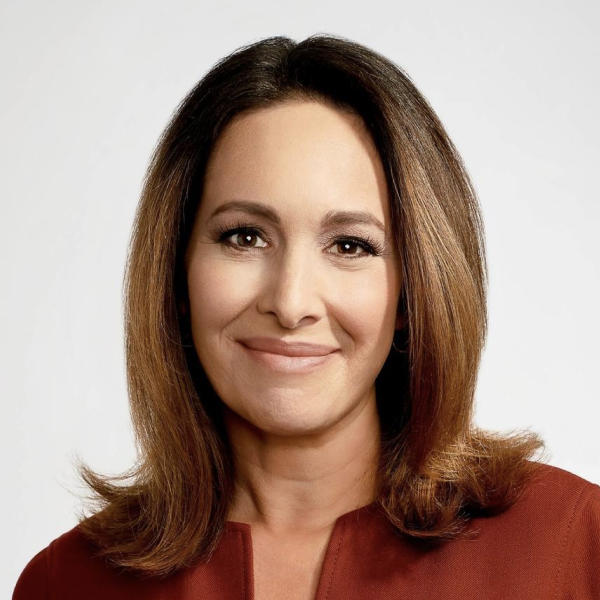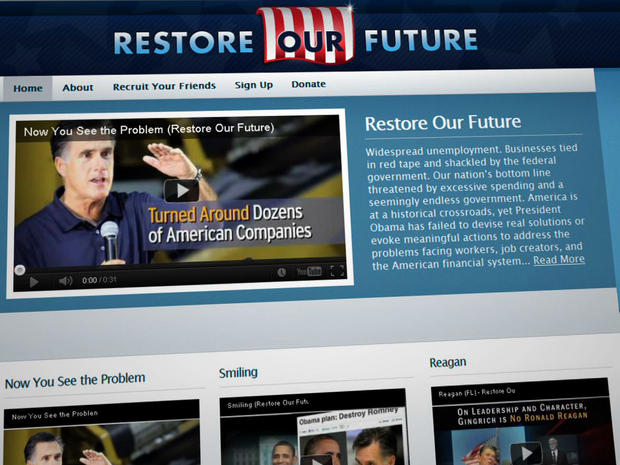Super PACs spend beyond Super Tuesday
(CBS News) NEW YORK - Fresh off assisting Mitt Romney to win Ohio and five other states in the Super Tuesday presidential primaries, a Super PAC supporting Romney is not slowing down.
Restore Our Future, which spent close to $3 million on TV ads advocating for Romney and attacking rival Rick Santorum in Ohio alone, has already allocated $2.7 million for advertising in the next big four primary states, according to spokeswoman Brittany Gross. The Super PAC is spending $739,000 on ads in Alabama and $615,000 in Mississippi -- both states hold primaries Tuesday -- and by next week, ROF will also spend $937,000 on ads in Illinois, which votes on March 20, and $451,000 on ads in Louisiana, which votes on March 24.
Attacking Rick Santorum's congressional voting record is the theme, as one ROF ad intones, "Twenty years in Washington changed Santorum's principles." Another ROF ad juxtaposes Romney's record creating jobs in the private sector and balancing the Massachusetts state budget as governor to what it describes as multiple votes on Capitol Hill by Santorum to raise the national debt limit and spend "billions in waste."
Before Ohioans voted Tuesday, they endured nearly 8,000 airings of such TV and radio ads about the presidential candidates, according to the Campaign Media Advertising Group, and 75-percent of those ads were paid for by Super PACS. CMAG found Super PACS funded 5,869 spots, triple the number produced by the campaigns, which paid for another 2,055 spots. One thing the ads by Super PACS and campaigns had in common? About nine out of ten ads were negative attacks on opponents, according to CMAG.
After sending more than $800,000 on ads in Ohio, the Red White and Blue Fund, a pro-Santorum "Super PAC," is also still spending lots of green. RWB Fund has allocated $500,000 for ad time in Alabama and Mississippi to feature a new, 30-second attack on Romney.
Video: The rising power of Super PACs
Pro-Santorum super PAC calls on Gingrich to drop out
"Like Obama, Romney drastically increased spending, increased state taxes and fees," an RWB Fund ad claims of Romney's one term as governor. "Mitt created 'Romneycare,' the blueprint for 'Obamacare."
Unlike candidates' campaigns, which are limited to a $2,500 donation per individual during the primary season, Super PACS can receive unlimited amounts not only from individuals but also from corporations and labor unions, with one caveat: staff for the Super PACs and the campaigns must not coordinate spending, ad campaigns, or any other activities.
Rick Tyler, a former spokesman for former House Speaker Newt Gingrich and now a senior adviser to Winning Our Future, a Super PAC supporting Gingrich, maintains that he keeps his distance.
"I don't have conversations with the campaign. I don't hang out with people in the campaign. I don't go to campaign events," Tyler said in an interview. "I don't Email with them."
Tyler said that Gingrich, unlike Romney and Santorum, has not attended any Super PAC fundraisers, though the candidate is permitted to do so.
A large amount of Super PAC giving continues to concentrated in a small number of hands. For example, during the month of January (the latest month for which Federal Election Reports have been filed), $19 million, or 70-percent of the $27 million raised by Super PACs supporting presidential candidates came from just five men.
Nevada casino mogul Sheldon Adelson and family gave $10 million to the pro-Gingrich Winning Our Future.
Texas tycoon Harold Simmons and his company, Contran, spread out $5.6 million, giving six-figures to the pro-Romney and pro-Gingrich groups, but sent his biggest check to American Crossroads, a Super PAC devoted to sending conservative Republicans to Washington.
Silicon Valley entrepreneur Peter Thiel added another $1.7 million to his tab for the pro-Ron Paul Endorse Liberty Super PAC, while Louisiana energy executive William Dore gave $1 million to the pro-Santorum RWB Fund. Wyoming investor Foster Friess brought his RBW Fund total to seven-figures with another $669,000 gift.
Stuart Roy, a spokesman for RBF Fund, said in an interview it is ironic that millionaire donors have made underdogs like Santorum and Gingrich stronger.
"You have candidates that are now competitive who otherwise would not have been. I don't think you could argue that Rick Santorum would be in the presidential and caucus situation right now if it were not for Super PACs," Roy said.
Roy also said the rules keeping Super PACS and campaigns apart are becoming less of an obstacle to the PACs' effectiveness.
"I've seen the Super PACs, I think, get more sophisticated over the course of the campaign have gotten more sophisticated in terms of online, in terms of advocacy efforts, in terms of phones and mail, and other campaign type elements on the ground," Roy said. "They are operating much more like a full campaign would operate."
Tyler argues Super PACs would become obsolete if individuals were allowed to give unlimited money directly to candidates.
"I suspect we'd have a much healthier election if candidates had to take responsibility all their own ads," Tyler said. "I would do away with the $2,500 limits. I'd make it very simple: candidates can raise all the money they want -- from individuals, from corporations, no foreign sources of money -- and they must make their contributions transparent the day they make the deposit in the bank."
Super PACs may drive spending in the presidential campaign above $2 billion dollars in 2012. Roy puts that figure in a larger perspective to make it sound less ominous.
"Look at L'Oreal, for instance -- sells perfume and makeup and cosmetics. Their marketing budget roughly, give or take a few million, is about $6 billion a year. If you look at Chrysler, their marketing budget is somewhere in the neighborhood of about$3 billion a year." Roy says. "So I think if we spend $1 billion or $2 billion dollars electing the leader of the free world, I think that is probably a good thing."

